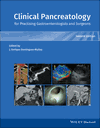What is Relevant on Genetics in Chronic Pancreatitis for Clinical Practice?
What Genes and When to Evaluate Them?
Jonas Rosendahl
Department of Internal Medicine I, Martin Luther University, Halle-Wittenberg, Germany
Search for more papers by this authorJonas Rosendahl
Department of Internal Medicine I, Martin Luther University, Halle-Wittenberg, Germany
Search for more papers by this authorJ. Enrique Domínguez-Muñoz MD, PhD
Director
Department of Gastroenterology and Hepatology, University Hospital of Santiago de Compostela, Santiago de Compostela, Spain
Search for more papers by this authorSummary
The first pedigree of a family with hereditary chronic pancreatitis was described in 1952. Thereafter, in 1996 the first genetic association with chronic pancreatitis (CP) was identified in the cationic trypsinogen gene. Since then, several genetic associations have been found that have improved our understanding of CP as a complex disorder. The current knowledge of genetic associations in CP impacts our clinical practice. This chapter summarizes which genes should be analyzed in patients with CP and which associations need to be taken into account when patients are screened. Especially in patients with early-onset CP, the diagnosis of cystic fibrosis needs to be ruled out. The diagnostic work-up should be performed in line with current recommendations. Several studies have reported an increased risk for pancreatic cancer in patients with CP that seems to be highest in patients with inherited CP.
References
- Comfort MW, Steinberg AG. Pedigree of a family with hereditary chronic relapsing pancreatitis. Gastroenterology 1952; 21: 54–63.
- Whitcomb DC, Gorry MC, Preston RA, et al. Hereditary pancreatitis is caused by a mutation in the cationic trypsinogen gene. Nat Genet 1996; 14: 141–145.
- Sanger F, Coulson AR. A rapid method for determining sequences in DNA by primed synthesis with DNA polymerase. J Mol Biol 1975; 94: 441–448.
- Lohr JM, Dominguez-Munoz E, Rosendahl J, et al. United European Gastroenterology evidence-based guidelines for the diagnosis and therapy of chronic pancreatitis (HaPanEU). United Eur Gastroenterol J 2017; 5: 153–199.
- Hoffmeister A, Mayerle J, Beglinger C, et al. English language version of the S3-consensus guidelines on chronic pancreatitis: definition, aetiology, diagnostic examinations, medical, endoscopic and surgical management of chronic pancreatitis. Z Gastroenterol 2015; 53: 1447–1495.
- Witt H. [No magic bullet: genetic diagnostics and predictive testing]. Dtsch Med Wochenschr 2017; 142: 652–656.
- Fjeld K, Weiss FU, Lasher D, et al. A recombined allele of the lipase gene CEL and its pseudogene CELP confers susceptibility to chronic pancreatitis. Nat Genet 2015; 47: 518–522.
- Rosendahl J, Witt H, Szmola R, et al. Chymotrypsin C (CTRC) variants that diminish activity or secretion are associated with chronic pancreatitis. Nat Genet 2008; 40: 78–82.
- Witt H, Beer S, Rosendahl J, et al. Variants in CPA1 are strongly associated with early onset chronic pancreatitis. Nat Genet 2013; 45: 1216–1220.
- Witt H, Luck W, Hennies HC, et al. Mutations in the gene encoding the serine protease inhibitor, Kazal type 1 are associated with chronic pancreatitis. Nat Genet 2000; 25: 213–216.
- Lasher D, Szabo A, Masamune A, et al. Protease-sensitive pancreatic lipase variants are associated with early onset chronic pancreatitis. Am J Gastroenterol 2019; 114: 974–983.
- Witt H, Sahin-Toth M, Landt O, et al. A degradation-sensitive anionic trypsinogen (PRSS2) variant protects against chronic pancreatitis. Nat Genet 2006; 38: 668–673.
- Rosendahl J, Landt O, Bernadova J, et al. CFTR, SPINK1, CTRC and PRSS1 variants in chronic pancreatitis: is the role of mutated CFTR overestimated? Gut 2013; 62: 582–592.
- Rosendahl J, Kirsten H, Hegyi E, et al. Genome-wide association study identifies inversion in the CTRB1–CTRB2 locus to modify risk for alcoholic and non-alcoholic chronic pancreatitis. Gut 2018; 67: 1855–1863.
- Whitcomb DC, LaRusch J, Krasinskas AM, et al. Common genetic variants in the CLDN2 and PRSS1–PRSS2 loci alter risk for alcohol-related and sporadic pancreatitis. Nat Genet 2012; 44: 1349–1354.
- Weiss FU, Schurmann C, Teumer A, et al. ABO blood type B and fucosyltransferase 2 non-secretor status as genetic risk factors for chronic pancreatitis. Gut 2016; 65: 353–354.
- National Institute for Health and Care Excellence. Cystic Fibrosis: Diagnosis and Management. NICE Guideline NG78. London: NICE, 2017. Available at https://www.nice.org.uk/guidance/ng78
- Cohn JA, Friedman KJ, Noone PG, et al. Relation between mutations of the cystic fibrosis gene and idiopathic pancreatitis. N Engl J Med 1998; 339: 653–658.
- Sharer N, Schwarz M, Malone G, et al. Mutations of the cystic fibrosis gene in patients with chronic pancreatitis. N Engl J Med 1998; 339: 645–652.
- Masson E, Chen JM, Audrezet MP, et al. A conservative assessment of the major genetic causes of idiopathic chronic pancreatitis: data from a comprehensive analysis of PRSS1, SPINK1, CTRC and CFTR genes in 253 young French patients. PLoS One 2013; 8: e73522.
- Weiss FU, Simon P, Bogdanova N, et al. Complete cystic fibrosis transmembrane conductance regulator gene sequencing in patients with idiopathic chronic pancreatitis and controls. Gut 2005; 54: 1456–1460.
- Raimondi S, Lowenfels AB, Morselli-Labate AM, et al. Pancreatic cancer in chronic pancreatitis: aetiology, incidence, and early detection. Best Pract Res Clin Gastroenterol 2010; 24: 349–358.
- Kirkegard J, Mortensen FV, Cronin-Fenton D. Chronic pancreatitis and pancreatic cancer risk: a systematic review and meta-analysis. Am J Gastroenterol 2017; 112: 1366–1372.
- Howes N, Lerch MM, Greenhalf W, et al. Clinical and genetic characteristics of hereditary pancreatitis in Europe. Clin Gastroenterol Hepatol 2004; 2: 252–261.
- Hegyi E, Sahin-Toth M. Human CPA1 mutation causes digestive enzyme misfolding and chronic pancreatitis in mice. Gut 2019; 68: 301–312.
- Rosendahl J. Unfolding the mystery of digestive enzyme misfolding in chronic pancreatitis. Gut 2019; 68: 181–182.
- Manolio TA, Collins FS, Cox NJ, et al. Finding the missing heritability of complex diseases. Nature 2009; 461: 747–753.



